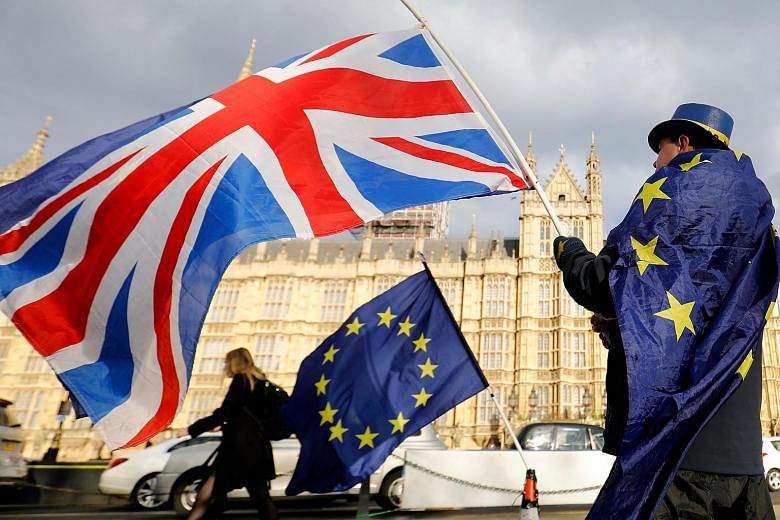EDINBURGH (Reuters) - Progress in the Brexit negotiations is needed urgently, British and European business and union representatives said on Wednesday (June 27)in a joint plea to London and Brussels ahead of this week's European Union summit.
"We are calling on the UK government and the EU to inject pace and urgency in the negotiations, bringing about measurable progress, in particular a backstop arrangement to avoid a hard border in Ireland," a statement from business leaders and unions on both sides of the English channel said.
They appealed to the EU and UK governments to "put jobs and prosperity before politics when seeking solutions that will matter for generations to come."
With nine months to go before Britain leaves the EU, British Prime Minister Theresa May has been unable to offer any clarity on how trade with the world's biggest trading bloc will work after Brexit because she is still negotiating a deal.
But industry nervousness has intensified in recent days ahead of the EU summit, and corporations such as Siemens , Airbus and BMW have gone on record about their fears of what a haphazard Brexit may do to their economic interests.
Wednesday's statement was signed by the heads of BusinessEurope and the Confederation of British Industry and their counterparts at the European Trade Union Confederation and Britain's Trades Union Congress. They together represent 45 million workers and 20 million employers.
"The UK government and the EU will need to agree on all aspects of regulatory alignment, which is of the utmost importance, without jeopardising the integrity of the single market," the statement added.
On the British government side, infighting in May's Cabinet over Brexit has continued to tie her hands.
Foreign Secretary Boris Johnson, a pro-Brexit champion, was reported to have dismissed business fears using foul language when speaking to EU ambassadors, The Telegraph newspaper reported on Saturday.
A spokesman disputed that he had used bad language.
In the interests of both boardrooms and ordinary workers, the two sides' actions must seek to preserve value chains and avoid non-tariff trade barriers, find solutions for barrier-free and frictionless trade in goods and services and a mechanism to agree a level playing field for workers' rights, the statement said.
A committee of British lawmakers said on Wednesday the government's estimate of how much it will have to pay the European Union as part of its divorce settlement is at least 10 billion pounds (US$13 billion) too low.
Negotiators in London and Brussels have agreed on a divorce bill of 35 to 39 billion pounds, due to be paid over the next few decades after Britain leaves the bloc.
The bill was one of the most inflammatory elements of Britain's withdrawal negotiations, with vocal Brexit campaigners in May's party angry at having to pay anything at all.
The agreement was seen as an achievement for May because it came in lower than some initially feared.
But parliament's Public Accounts Committee said the figure, which estimated the cost to the country as a whole, was an underestimate of the actual cost to public finances and said the government needed to be clearer.
"The true cost of Brexit is a matter of outstanding public interest. Government must provide parliament and the public with clear and unambiguous information," committee chairwoman Meg Hillier said.
"Government's narrow estimate of the so-called divorce bill does not meet this description. It omits at least 10 billion of anticipated costs associated with EU withdrawal and remains subject to many uncertainties," she added.
The report said it did not include 3 billion pounds of payments Britain would have to make to the European Development Fund, which the EU uses to provide overseas aid.
The finance ministry said May had been clear that Britain would honour commitments to the EU which were made while it was still a member of the bloc.
"We have negotiated a settlement that is fair to UK taxpayers and ensures we will not pay for any additional EU spending beyond what we signed up to as a member," a Treasury spokesman said.
The committee also said the estimated overall settlement included around 7.2 billion pounds of EU funding which will go directly to private sector bodies and would therefore not offset the cost to government.
The original finance ministry estimate of the overall cost to the country did not distinguish between flows to private and public sector bodies, and simply deducted a combined amount from the cost.
The Treasury said: "The National Audit Office confirmed in April that our estimated figure is a reasonable calculation. Now we are discussing what our future relationship looks like.

